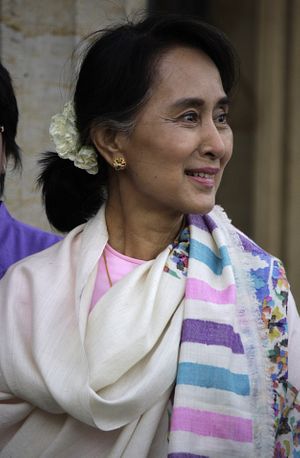Citing a senior member of Myanmar’s opposition party, Reuters reports that Aung San Suu Kyi will visit China in December for a “goodwill” visit. Win Htein of the National League for Democracy (NLD) said the visit would last about a week.
Suu Kyi, the chairperson of the NLD, famously spent the better part of 20 years under house arrest after the government refused to recognize her party’s successes in the 1990 general election. Suu Kyi was awarded the Nobel Peace Prize “for her non-violent struggle for democracy and human rights” in 1991, but remained under house arrest until 2010, when the Myanmar government released her as part of a general reform effort that promised greater respect for human rights.
Suu Kyi’s release helped usher in a general thawing of relations between Myanmar and the West, particularly the U.S. This led to the easing of Western sanctions, which in turn has reduced Myanmar’s reliance on the Chinese government for support. To ensure its continued influence in Myanmar, China will have to change its approach, particularly if the current opposition party gains power in next year’s elections.
Suu Kyi is ineligible to run for Myanmar’s presidency thanks to a controversial constitutional ban that prevents spouses and parents of foreign citizens from serving as president. Still, the NLD is tentatively projected to perform well in the 2015 general elections, although whether or not the party can win an outright majority is unclear. Either way, it makes good political sense for China to start forming a solid relationship with the leader of one of Myanmar’s up-and-coming political parties, something Beijing has been taking slow steps to do since her release in 2011. If nothing else, Beijing can help fight against popular perceptions in Myanmar that it supports the military regime, to the detriment of Myanmar’s people.
Asked about reports that Suu Kyi will visit China, Chinese Foreign Ministry spokesperson Hua Chunying said she didn’t have “exact information” about the trip (but significantly, did not refute the reports). Hua added, “We stay in touch and maintain sound communication with all political parties and political bodies of Myanmar, including the National League for Democracy, for the all-round development of China-Myanmar relations.”
Suu Kyi’s motivations for the trip are more mixed. On one hand, if her party is to lead Myanmar, it will need to have a solid relationship with Beijing, which accounts for over 30 percent of total foreign investments in Myanmar. Mainland China and Hong Kong combined had $20.8 billion invested in Myanmar as of June 2014 – nearly half the total investments of $46.7 billion. Suu Kyi’s visit to China is thus a political necessity, allowing her to make connections with Myanmar’s most important economic partner.
On the other hand, however, there are risks. Suu Kyi’s reputation is largely tied to her democratic ideals, and there’s an ugly symbolism behind Suu Kyi’s trip to China. Until Suu Kyi’s release, she and Chinese dissident Liu Xiaobo were the only two recipients of the Nobel Peace Prize to be imprisoned. While Suu Kyi is now free to pursue her political goals, Liu is not. Visiting China and ignoring the plight of her fellow Nobel laureate could damage Suu Kyi’s reputation as a champion for human rights and democracy.
































